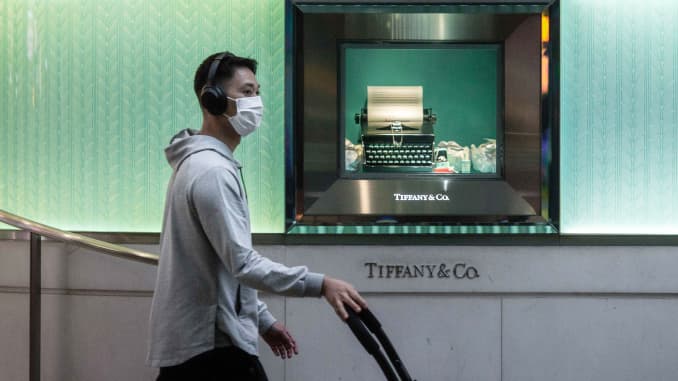- A luxury rebound in China is fueling hopes of a rapid recovery for high-end brands.
- Yet analysts say the wealthy are likely spend very differently in the post-pandemic world.
- Analysts expect consumers to shop more locally, buy accessories such as handbags and forgo travel.

A luxury rebound in China is fueling hopes of a rapid recovery for high-end brands. Yet analysts say the wealthy are likely spend very differently in the post-pandemic world.
Many of the biggest brands in China — including Louis Vuitton, Hermes, Gucci and Prada — are seeing rapid bounce backs in sales as stores reopen in China, according to Claudia D’Arpizio, partner at Bain & Co who focuses on luxury. After a steep and sudden drop in the first quarter, many top brands will end up positive for 2020 in China given the strong sales, she said.
The Hermes store in Guangzhou, for instance, hauled in $2.7 million in sales the day it reopened in April —believed to be a record for a boutique in China. The burst of sales has created a new retail term for the post-lockdown rebound: “revenge spending.” The idea is that consumers were shopping starved during their quarantine and are overcompensating by splurging more than usual.
“We’re seeing people come back to the stores quite quickly,” D’Arpizio said. “It’s not yet at the same levels yet as it was before the crisis. But revenge spending is happening — and also to some degree in Europe. The people who are coming back into the stores are strongly motivated to buy.”
Bain expects luxury sales worldwide to fall by up to $100 billion this year, or about a third, from around $300 billion in 2019 to around $200 billion to $240 billion this year. Bain said it doesn’t expect sales to recover to 2019 levels until 2022 or 2023.
Yet the spending of the rich will shift dramatically in the next year or two, Bain said. Instead of splurging on experiences, which dominated luxury spending over the past decade and fueled much of its growth, the rich will focus their spending on physical products.
Analysts say it will take at least a year or two before the affluent want return to crowded planes, restaurants and resorts.
“I think we will see a near-term rebalancing away from expensive holidays and back to products,” D’Arpizio said.
Another big trend: accessories. Handbags and shoes will rule luxury spending in the near term, since they are accessible indulgences that cross all price points. Watches and menswear will suffer, along with women’s formal wear and dress clothes, Bain said.
Jewelry will be a mixed bag. That’s in part because the price of gold has soared, she said.
Luxury brands spent fortunes in recent years creating lavish boutiques and offering in-store “buying ceremonies” to lure clients. Now, spending will shift online and companies may need to shrink their store counts and adapt to fewer retail consumers.
Consumers will spend closer to home rather than traveling. In Europe, where luxury stores were often packed with Chinese tourists, brands now cater to a more local clientele. Generation Y is also expected to drive much of the spending in China as they shop online, Bain said.
“There will be a strengthened sense of local pride,” D’Arpizio said.
The big question for global luxury, however, is whether the post-crisis populism of the 2008 financial crisis, which gave rise to “luxury shame” and a backlash against lavish spending, will reappear this time. The coronavirus has already sparked concerns over rising inequality and bailouts for the wealthy and big corporations.
But D’Aripizio said she expects that an anti-luxury wave is less likely this time.
“We could certainly have some tensions in Europe and the U.S., especially with the U.S. election coming up,” she said. “But this crisis is more democratized.”
She added that luxury products don’t have the same stigma as they used to, since many now focus on craftsmanship, sustainable values and inclusiveness.
“It’s not about showing off your wealth anymore,” she said.